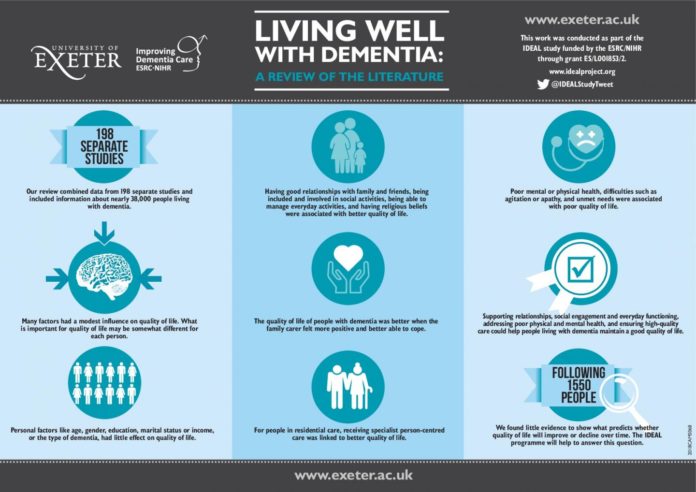According to a new study by the University of Exeter in collaboration with the Economic and Social Research Council (ESRC) and the National for Health Research (NIHR), good relationships, social engagement, better everyday functioning, good physical and mental health, and high-quality care could lead having a better quality of life for people with dementia.
In order to support people to live as well as possible with dementia, scientists mainly identified key factors that can be targeted. While many investigations focus on prevention and better treatments, but scientists believe that it’s equally vital to understand how we can optimize the quality of life for the 50 million people worldwide who have dementia.
Professor Linda Clare, at the University of Exeter, said, “We now need to develop ways to put these findings into action to make a difference to people’s lives by supporting relationships, social engagement and everyday functioning, addressing poor physical and mental health, and ensuring high-quality care.”
Scientists conducted a systematic review and meta-analysis to examine all available evidence about the factors that are associated with quality of life for people with dementia. They gathered the data from 198 studies which involved more than 37,000 people.
The investigation found that statistical factors, for example, gender, education, marital status, income or age were not related to personal satisfaction in individuals with dementia. Nor was the kind of dementia.
Elements that are connected with the low quality of life incorporate poor mental or physical well-being, troubles, for example, fomentation or detachment, and neglected needs.
Factors that are connected with better QoL include having great associations with family and companions, being incorporated and engaged with social exercises, having the capacity to oversee regular exercises, and having religious convictions.
Numerous different factors indicated a little yet factually huge relationship with personal satisfaction. This proposes the manner by which individuals assess their personal satisfaction is identified with numerous parts of their lives, every one of which has a humble impact. It is likely that to some degree the viewpoints that are most essential might be diverse for every individual.
Dr Anthony Martyr, a lead author on the study, from the University of Exeter, said: “While in general, it is more of a challenge to maintain a good quality of life as dementia progresses, we found little evidence to show what predicts whether a quality of life will improve or decline over time. The IDEAL programme we are currently leading will follow people living with dementia for several years and will help to answer this question.”
Dr. Doug Brown, Chief Policy and Research Officer at Alzheimer’s Society, said: “Maintaining a healthy social life and doing things you enjoy is important for everyone’s quality of life. As this Alzheimer’s Society funded study highlights, people living with dementia are no exception.”
“Someone develops dementia every three minutes but too many are facing it alone and feel socially isolated a factor that researchers pinpoint contributing to a lower quality of life.”
“People with dementia have a right to continue living a life they love. Alzheimer’s Society’s Dementia Friendly Communities initiative enables individuals, businesses, and communities to involve and empower people affected – but we need all of society to unite to ensure people with dementia feel understood, valued and able to contribute to their community.”
The study supported by the London School of Economics, the universities of Sussex, Bangor, Cardiff, Brunel and New South Wales in Australia, and Kings College London, is published in Psychological Medicine.
